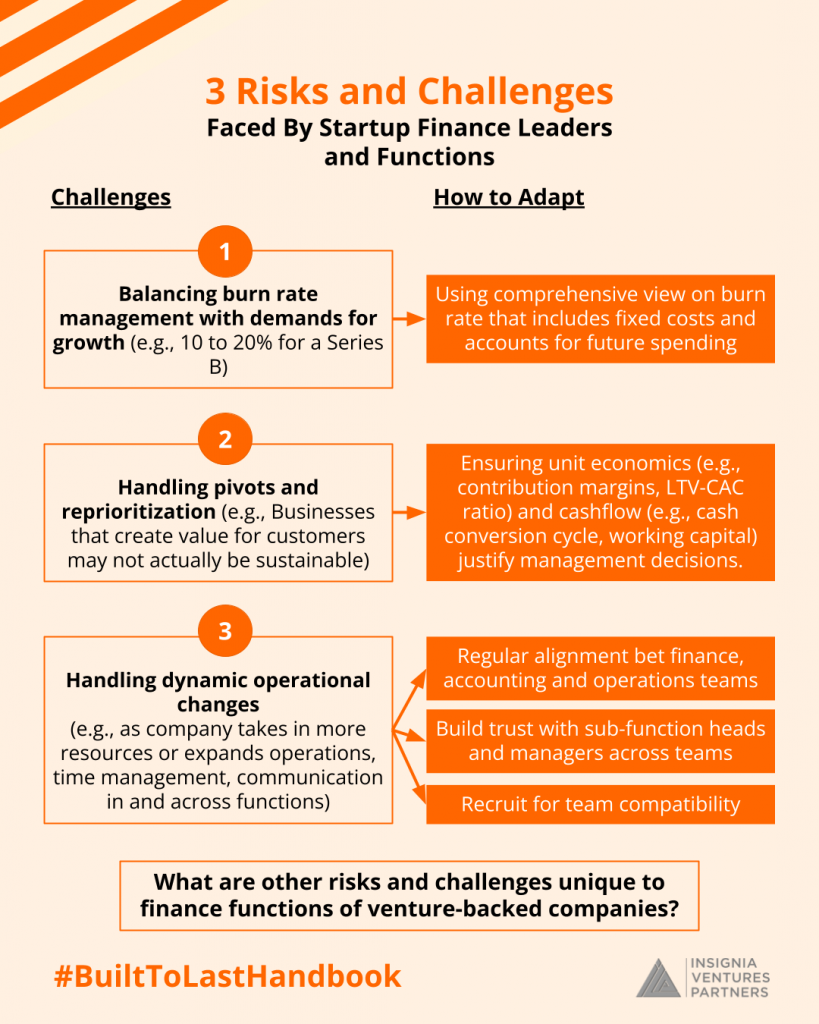When managing the finance function of a startup, CEOs and CFOs face unique risks and challenges.
From balancing growth and sustainability to navigating dynamic operational changes, the financial management of a startup requires careful planning and strategic thinking. Here’s a detailed look at some of these challenges and how to adapt:
Read last week’s article on building your startup’s finance function
Startup Finance Function Challenge 1: Balancing Burn Rate Management with Demands for Growth
Growing a startup by 10% to 20% monthly is a common expectation for growth stage venture-backed companies (even higher the earlier). However, this requires careful burn rate management, including consideration of fixed costs and future spending. Balancing the need for growth with the imperative to maintain financial stability can be a complex task. The challenge here lies in finding the right equilibrium between expansion and sustainability, as too much growth can lead to financial instability, while too little stifles progress.
Startup Finance Function Challenge 2: Handling Pivots and Reprioritization
Not all businesses that create value for customers are financially sustainable. Financial teams must analyze the unit economics (such as contribution margins and LTV-CAC ratio) and cashflow to guide management decisions. If a startup is unable to generate revenue, it might need to pivot or reevaluate its strategy. Ensuring that the business model is not only valuable but also profitable is essential for long-term success.
Startup Finance Function Challenge 3: Handling Dynamic Operational Changes
As a startup grows and evolves, the following adaptations become crucial:
(1) Regular Alignment Between Finance, Accounting, and Operations Teams:
Startups often undergo dynamic operational changes, especially during funding rounds like Series B and C. As the team grows from a few hundred to over a thousand members, clear communication and alignment between departments become vital.
(2) Choosing Meetings Wisely & Building Trust:
Time management and trust-building within the team are essential for a smoothly running operation. Prioritizing meetings and building rapport with team members ensures better collaboration and personal development.
(3) Creating Alignment Meetings:
Regular alignment meetings between accounting, finance, and operational teams can lead to positive changes. These meetings often break down barriers and enhance communication, allowing for a more cohesive team environment.
(4) Recruiting for Team Compatibility:
Creating a culture of teamwork and retaining the best talents requires careful hiring. With the right team compatibility, employee turnover can be minimized, contributing to the overall success and stability of the startup.

3 Risks and Challenges faced By Startup Finance Leaders and Functions. Insights from Insignia Ventures Academy’s StartCFO program
Managing the finance function of a startup is a multifaceted challenge that requires strategic planning, adaptability, and strong teamwork. Balancing growth with financial stability, steering the company in the right direction, and managing operational changes are all crucial aspects that require attention and care. By recognizing these challenges and adapting accordingly, startups can pave the way for success.
Follow our LinkedIn page for the new posts on startup finance every Monday!
Paulo Joquiño is a writer and content producer for tech companies, and co-author of the book Navigating ASEANnovation. He is currently Editor of Insignia Business Review, the official publication of Insignia Ventures Partners, and senior content strategist for the venture capital firm, where he started right after graduation. As a university student, he took up multiple work opportunities in content and marketing for startups in Asia. These included interning as an associate at G3 Partners, a Seoul-based marketing agency for tech startups, running tech community engagements at coworking space and business community, ASPACE Philippines, and interning at workspace marketplace FlySpaces. He graduated with a BS Management Engineering at Ateneo de Manila University in 2019.